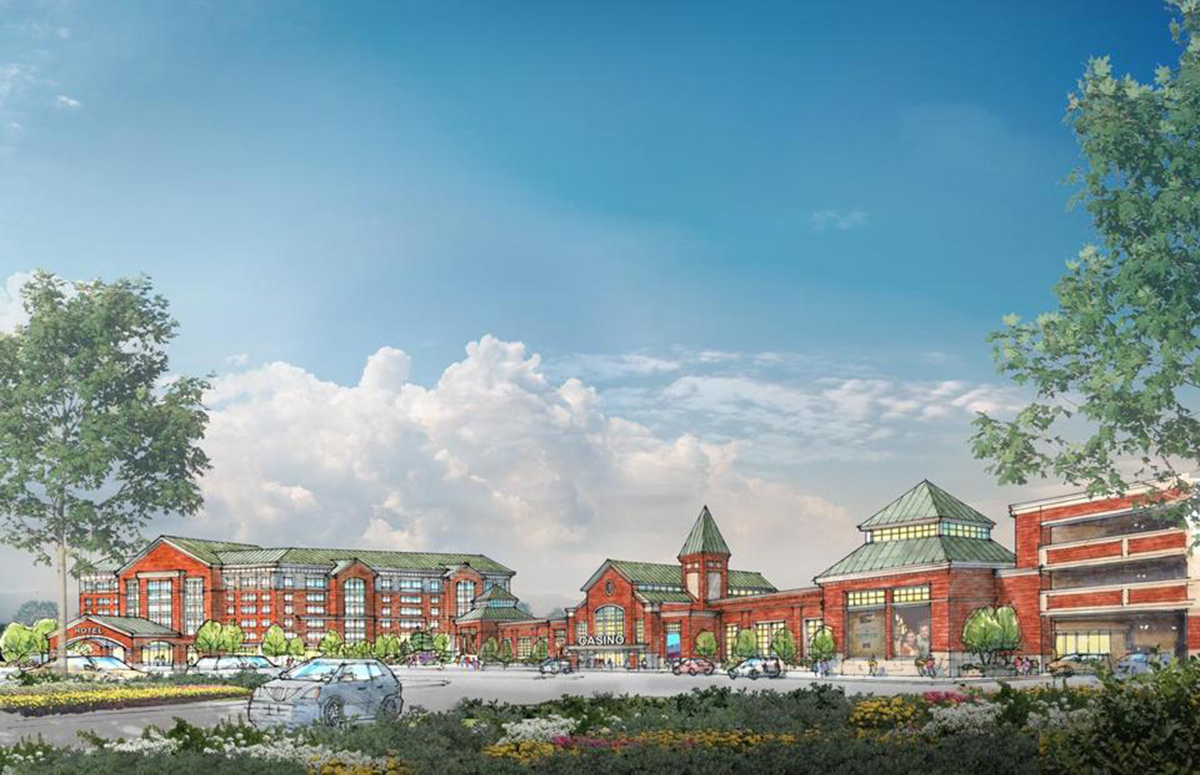Casino Licensing Process on South Coast Will Move Forward

A rendering of the Brockton Casino. / Via Klai Juba Wald Architects
The proposed $650 million Brockton casino, potentially the fourth major gambling hall in the state, will get a shot at the lone southeastern Massachusetts casino license.
The Massachusetts Gaming Commission decided to press on with the vetting process for the Region C resort casino license at their open meeting on Thursday. The commissioners, while disappointed with New Bedford bowing out of the process, said they owed it to the people of the South Coast region to give the Brockton proposal a fair shot at a license.
The backers of the project told the commission the casino would not only transform Brockton but the enitre southeastern Massachusetts economy. They insisted that if the process went smoothly they would have the casino fully operational before the approved projects in Springfield and Everett even opened their doors.
“We believe if we could get a license by the end of this year, we could be up and running by either the late spring or early summer of 2018. We are shovel-ready to go,” saidRush Street Gaming Chairman Neil Bluhm, the backer of the proposal.
Bluhm, obviously aware that the commission was spooked by the collapse of the New Bedford project and weary of the rise of the tribal gaming in nearby Taunton, attempted to allay their fears. The possible saturation of gaming options in the region, a well documented phenomenon across the country, particularly in Reno and Atlantic City, is not an unrealistic fear with Plainridge Park already up and running in Plainville.
“We think the chances are not that high that they will ultimately get one,” said Bluhm.
Brockton’s project would benefit immensely from the long delays at both licensed casinos.
“We represent the lowest risk, we’re a proven successful developer and we wouldn’t be putting up all this equity if we weren’t convinced this would be a successful project,” said Bluhm.
Brockton Mayor Bill Carpenter said the planned casino would do wonders for the city’s economic situation. He talked about boosted revenues in terms of restoration not in expansion. The picture he painted without the casino was quite bleak.
“We have no capital money in our budget,” said Carpenter, noting the city will receive a minimum of $10 million in annual payments.
Carpenter talked of how the casino would become an economic powerhouse in the region with its scale and buying power. The host community agreement the casino signed with the city guarantees the business-to-buisness transactions it makes will take place overwhelming in Brockton and the southeastern region. “Brockton would become a major entity in the region,” said Carpenter.
The casino project was approved by just 50.5 percent of Brockton voters in a May referendum.
The commission never showed much hostility to the idea of Brockton applying for the Region C license without any competition, however, Chairman Stephen Crosby said repeatedly that the commission did not have to award a license if they were not satisfied with the Brockton proposal. He said they needed to see a more refined proposal from Rush Street Gaming and left the door open for a possible second applicant in the region.
“We never said we would issue a license in Region C. I think we will commit the commercial market process and then see what we get,” said Crosby.
Crosby said that the commission “owed it” to the people of Region C to go forward with the process.
The next step in the licensing process is the submission of a more detailed application from Brockton and Rush Street Gaming is due by September 30.

